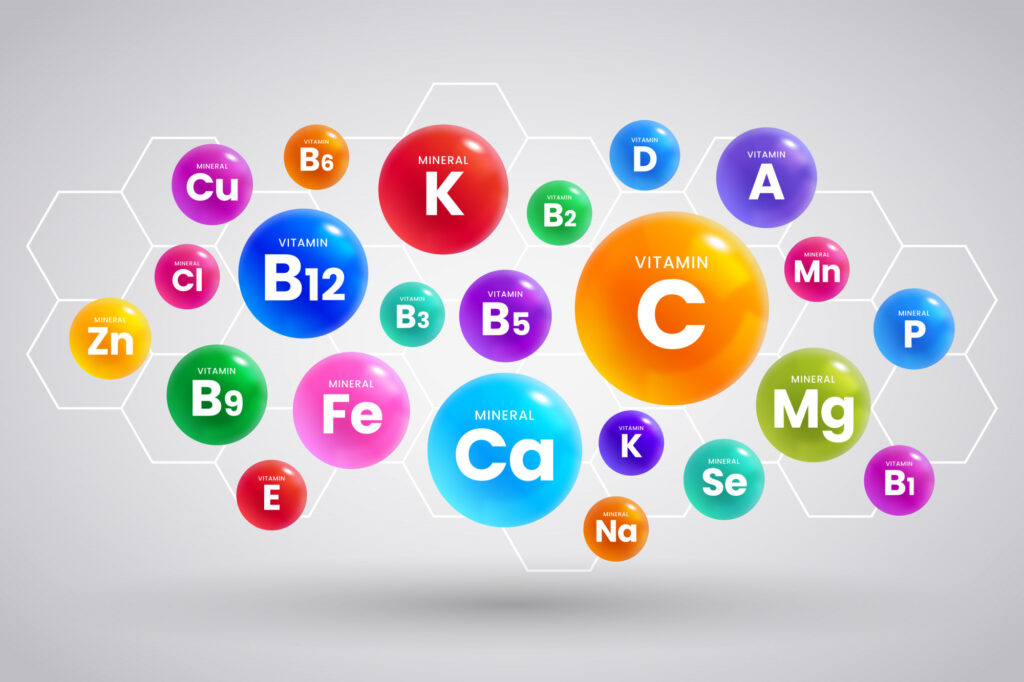Proper nutrition is essential for maintaining good health and well-being. One crucial aspect of nutrition is ensuring that your diet includes a wide variety of vitamins and minerals. In this comprehensive guide, we will focus on vitamins A to K and explore the great foods that can help you incorporate these essential nutrients into your daily meals. So let’s dive in!
Vitamin A:
Vitamin A plays a crucial role in maintaining healthy vision, promoting cell growth, and supporting a robust immune system. It is found in two forms: preformed vitamin A (retinol) from animal sources and provitamin A carotenoids (such as beta-carotene) from plant sources.
Great foods for vitamin A include:
- Sweet potatoes: These are an excellent source of beta-carotene, which the body converts into vitamin A.
- Carrots: Carrots are well-known for their high beta-carotene content, making them a nutritious choice.
- Spinach: Loaded with various nutrients, spinach is also rich in vitamin A.
- Cod liver oil: A concentrated source of retinol, cod liver oil provides a substantial amount of vitamin A.
- Mangoes: Besides being delicious, mangoes are a good source of beta-carotene.
Vitamin B:
The B-vitamins are a group of water-soluble vitamins that play vital roles in energy production, brain function, and the synthesis of red blood cells. The B-vitamin complex consists of eight different vitamins, including B1 (thiamine), B2 (riboflavin), B3 (niacin), B5 (pantothenic acid), B6 (pyridoxine), B7 (biotin), B9 (folate), and B12 (cobalamin).
Great foods for the B-vitamins include:
- Whole grains: Foods like brown rice, oats, and whole wheat bread are rich in B-vitamins.
- Legumes: Lentils, chickpeas, and kidney beans are excellent sources of various B-vitamins.
- Leafy greens: Spinach, kale, and Swiss chard contain folate, which is a crucial B-vitamin.
- Eggs: Eggs are not only a good source of protein but also provide B-vitamins, including B2 and B12.
- Milk and dairy products: These are excellent sources of riboflavin (B2) and vitamin B12.
Vitamin C:
Vitamin C is well-known for its role in supporting the immune system and acting as an antioxidant. It also aids in collagen synthesis, iron absorption, and wound healing.
Great foods for vitamin C include:
- Citrus fruits: Oranges, lemons, and grapefruits are rich sources of vitamin C.
- Bell peppers: Red, green, and yellow bell peppers are packed with vitamin C.
- Strawberries: These delicious berries are not only sweet but also a good source of vitamin C.
- Kiwi: Kiwi is a tropical fruit that provides a substantial amount of vitamin C.
- Broccoli: This cruciferous vegetable contains vitamin C and various other nutrients.
Vitamin D:
Vitamin D is unique because it can be synthesized by the body when exposed to sunlight. It plays a vital role in maintaining healthy bones, supporting the immune system, and regulating mood.
Great foods for vitamin D include:
- Fatty fish: Salmon, trout, and mackerel are excellent sources of vitamin D.
- Fortified dairy products: Some milk, yogurt, and cheese varieties are fortified with vitamin D.
- Egg yolks: The yolk contains vitamin D, making eggs a good dietary source.
- Mushrooms: Certain mushrooms, such as shiitake and maitake, provide vitamin D when exposed to sunlight.
Vitamin E:
Vitamin E is a powerful antioxidant that protects the body against free radicals. It also supports the immune system and helps in cell signaling.
Great foods for vitamin E include:
- Nuts and seeds: Almonds, sunflower seeds, and hazelnuts are rich in vitamin E.
- Spinach: Besides being a good source of vitamin A, spinach also provides vitamin E.
- Avocado: Avocados contain vitamin E, healthy fats, and various other nutrients.
- Vegetable oils: Wheat germ oil, sunflower oil, and safflower oil are all rich in vitamin E.
- Broccoli: This cruciferous vegetable contains vitamin E and other beneficial compounds.
Vitamin K:
Vitamin K is essential for blood clotting, bone health, and maintaining cardiovascular health.
Great foods for vitamin K include:
- Leafy greens: Kale, spinach, and Swiss chard are excellent sources of vitamin K.
- Broccoli: Along with vitamin E, broccoli also contains vitamin K.
- Brussels sprouts: These miniature cabbages are a nutritious source of vitamin K.
- Natto: A traditional Japanese food made from fermented soybeans, natto is rich in vitamin K2.
Green peas: Green peas provide a moderate amount of vitamin K.Incorporating a variety of these great foods into your diet will help ensure you get a healthy dose of vitamins A to K. Remember, a balanced diet consisting of whole foods is key to achieving optimal nutrition.
In her role as a Branding Adviser, Linda draws on her strategic thinking to assist businesses in building strong and authentic brand identities, effectively connecting with their target audiences. Her unique blend of skills, spanning emotional wellness, psychology, and branding, positions Linda Catalan as an influential figure in fostering personal growth and helping businesses thrive in the competitive market landscape."
- Is There A Delta-8 Thc CBD? - September 25, 2023
- Is Delta-8 Thc Addictive? - September 25, 2023
- Benefits of Chickweed Supplements - September 25, 2023











